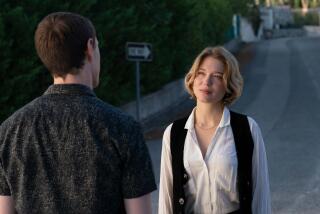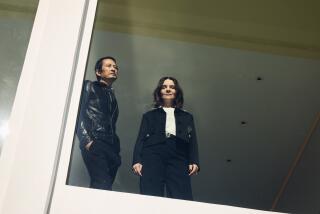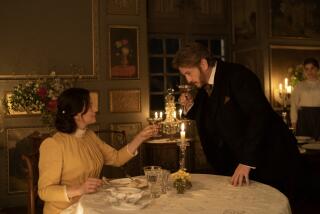Pair’s glacial calm is shattered by love
“Gabrielle” may well be director Patrice Chereau’s finest film, a period chamber drama drawn from a Joseph Conrad short story and of such intensity and passion that it transcends a specificity of time and place to achieve timelessness and universality.
Isabelle Huppert and Pascal Greggory are superb as a couple of immense wealth and social prestige in the Belle Epoque Paris of 1912 -- but then everything about this film is superb: Chereau and Anne-Louise Trividic’s script, which fleshes out the wife’s character; Eric Gautier’s cinematography with its Fantin-Latour-inspired lighting; its rich settings and costumes; Fabio Vacchi’s tempestuous score and Francois Gedigier’s razor-sharp editing that is crucial to Chereau’s evocation of a headlong plunge into emotional chaos.
Narrated by Greggory’s Jean Hervey, “Gabrielle” presents its hero as a man of knowing self-satisfaction whose friends tell him he possesses “the cold stare of achievement.” Actually, it reveals the utter coldness of his heart.
After a decade of marriage to Huppert’s Gabrielle, Jean is hugely pleased with himself. He is tall, lean and handsome, a man for whom every investment has turned to gold, and he and Huppert’s Gabrielle make a formidably attractive and assured couple who preside over a weekly salon in their museum-sized, servant-laden mansion.
Since Jean declares emotion to be revolting, he was perfectly happy that sexual intimacy vanished only months into his marriage. Gabrielle has told herself she is content to go along with the facade of a perfect marriage -- until she unexpectedly dives into an affair, with consequences for which “devastating” seems too inadequate a description.
As Jean and Gabrielle are supremely articulate and sophisticated, driven by pride and humiliation to explore the boundaries of knowledge of self and each other, their parrying swiftly takes on a cruel, ceaseless Strindbergian edge. For Jean, who has never believed in love, now may be unable to live without it, while Gabrielle, having experienced it, knows she can. The question becomes whether they will be able to resume the formal, appearance-conscious, even stifling way of life they both believe they want.
Chereau invites Greggory and Huppert to stretch their abilities to the utmost, allowing his Jean to become the prime mover, the dominating force, all the better to set off Huppert’s special gift in expressing a calm strength as enigmatic as it is unshakable.
Huppert is the preeminent French actress of her generation, whereas, despite an impressive and varied career as almost as long as Huppert’s, Greggory is little-known in the U.S., perhaps most familiar as a member of the ensemble cast of Chereau’s quixotic and beguiling “Those Who Love Me Can Take the Train.” However, Chereau strikes a balance between Huppert and Greggory that is reflected in the effective tension he generates between the theatrical and the cinematic in his film.
Amid its fireworks and melancholy, “Gabrielle” offers a jolting vision of a disintegrating relationship that seems consistently fresh and unexpected in its revelations.
*
‘Gabrielle’
MPAA rating: Unrated.
An IFC First Take Films release. Director Patrice Chereau. Producers Joseph Strub, Serge Catoire, Ferdinanda Frangipane. Screenplay Chereau, Anne-Louise Trividic; based on Joseph Conrad’s “The Return.” Cinematographer Eric Gautier. Editor Francois Gedigier. Running time: 1 hour, 30 minutes.
Exclusively at the Sunset 5, 8000 Sunset Blvd., West Hollywood, (323) 848-3500; Playhouse 7, 673 E. Colorado Blvd., Pasadena, (626) 844-6500.
More to Read
Only good movies
Get the Indie Focus newsletter, Mark Olsen's weekly guide to the world of cinema.
You may occasionally receive promotional content from the Los Angeles Times.










